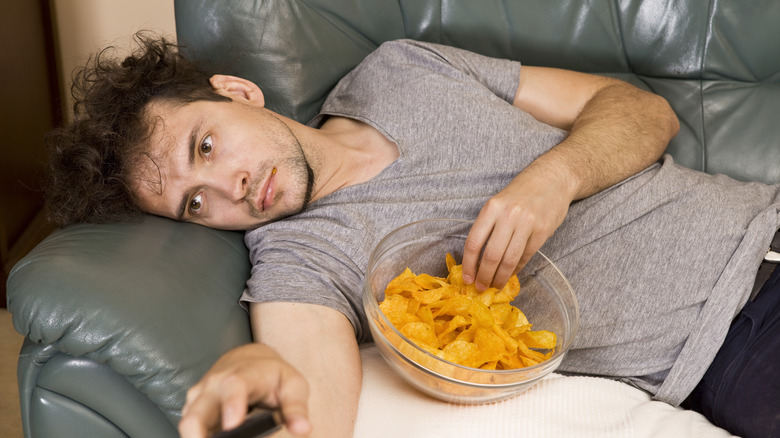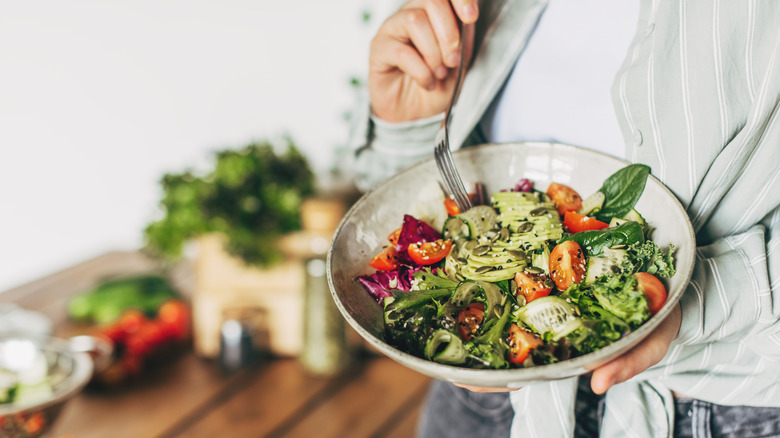Foods You'll Want To Avoid Right After A Flight
Going on a trip can be super exciting, but the flight? Not so much. Being cramped in a small seat, not being able to move around, and just waiting to get to your destination can be truly exhausting on the body. And let's not forget the effect of compressed air on the human body either. The entire flight can leave you fatigued, dehydrated, and bloated. As a result, there are certain foods that you should avoid eating after a flight, including fried or greasy foods, foods that are high in sugar, packaged snacks, and high-fat foods. All these foods can be harmful to your body and leave you exhausted, or even worsen your jet lag.
To get the best benefits and prevent the impact of flying from lasting too long on your body, make sure to hydrate before eating by drinking plenty of water or herbal teas to replenish your lost fluids. Keep in mind that flying can already cause strain on the body, so it is best to stick to small portions to ease the stress on your stomach. Also, while it can be tempting to grab a coffee to fight the fatigue of the flight, it's recommended to avoid caffeine or alcohol straight after landing, as these beverages can dry you out, increasing your dehydration. Stick to water to hydrate first.
Why you should avoid these foods post-flight
What and when you eat is the key to surviving a long-haul flight, so it's good to know what foods to avoid, and why. For starters, avoid eating rich foods, such as creamy sauces or fatty meats, as they're hard to digest, leading to bloating and discomfort, especially after a long flight. They're also high in calories, which can make you feel lethargic, and after hours of sitting it will only make it more difficult to combat jet lag or start your day. Fried foods should also be avoided as they can cause acid reflux and exacerbate indigestion.
Foods that are high in sugar, such as sodas or desserts, should not be on your list of what to eat post-flight. They lead to quick energy crashes that can leave you even more tired. They also worsen jet lag by disrupting your blood sugar balance with high spikes in sugar. Many people opt for easy packaged snacks post-flights, but keep in mind that the additives and sodium can lead to dehydration. These high-processed chips or snacks also provide little or no nutritional value, so it's best to avoid them. The extra additives can also irritate the digestive system, prolonging the discomfort. There are plenty of more nutritional choices to make instead.
What to eat instead and tips for better post-flight nutrition
After getting off a flight, it's best to prioritize foods that can help restore hydration levels in the body. Fresh fruits high in water, like watermelon, oranges, or grapes, are a great benefit as they provide essential vitamins and are considered a healthy snack option to kickstart your journey home. These snacks even help to reduce jet lag.
If you're extra hungry after a long flight, opt for easily digested foods, such as low-fat yogurt, white rice, or steamed vegetables. These foods are gentle on the stomach and easy to process, reducing the strain on your body and saving your energy levels. As for your proper meals, they should include lean protein foods, such as grilled chicken or boiled eggs, to help rebuild energy levels without overloading your digestion. Try to also add fiber-rich foods, such as leafy greens and whole grains, to help combat any post-flight bloating and improve digestion. One very helpful tip can be to pack healthy snacks, such as dried fruits or nuts, to have on hand straight after your flight. It's better than choosing harmful options just because you're hungry.


